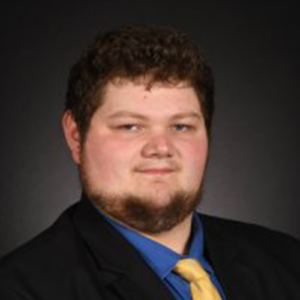Blogs | 9.9.2021
Alumni Profile: Jack Caudill
 Name: Jack Caudill
Name: Jack Caudill
Profession: P25 Radio Systems Technician, AMK Services
Education: Morehead State University, Radio and Television Broadcasting Technology B.S.
Which of our Challenger Learning Centers did you visit?
The Challenger Learning Center of Kentucky in Hazard, KY.
When did you visit a Challenger Learning Center?
I attended programs at the Challenger Learning Center of Kentucky from the ages of 5-13. I was chosen as the first high school board member and was later included as a full board member as an adult.
What do you remember most from your experience?
I remember how exciting it was to build, create, and experiment through the hands-on activities. The Challenger Learning Center also had some amazing exhibits, like the flight simulator in the Flight Factory! Of course, I recall the Rendezvous With a Comet mission that I flew with my classmates. My teacher, Ms. Pence, sure knew what she was doing when she assigned me to the Probe team! I remember the feeling of anticipation in hopes of a successful launch of the probe and the silent celebration of a job well done along with the entire group congratulations when it did! Beyond all of that, one of my most favorite memories was being able to attend EMERGENCY! camp – twice! Little did I know that it would serendipitously launch my career.
Have you always been interested in STEM?
Yes, I have always been interested in STEM, although the acronym wasn’t as popular when I was younger as it is now. Hands-on learning at the Challenger Learning Center enhanced my interest in those areas, making STEM even more intriguing and engaging for me.
Did the visit to the Challenger Learning Center affect your decision to pursue a STEM degree or career? If yes, how?
The Challenger Learning Center had a major role in my decision to pursue my current career. The summers after seventh and eighth grade, I attended the Center’s week-long EMERGENCY! camps. I couldn’t get enough of the first-responders and everything included in that world! While I was in the eighth grade I earned my Amateur (Ham) Radio license. This meant I was licensed to use two-way radios like the first responders did, just for different purposes. When I was 18, I became a volunteer firefighter to serve my community. I worked my way through college on the other side of two-way radio communication on the night shift as a 911 dispatcher. After college graduation, I started my career in the two-way radio world as a P25 Radio Systems Technician for AMK Services.
Do you use STEM lessons/principles in your job every day? If so, how?
I use STEM lessons and principles every single day in my job as a P25 Radio Systems Technician. The company I work for designs two-way radio systems for first responders, hospitals, airports, power companies, etc. We also install, program, and ensure that these systems are constantly working. Thinking on my feet to troubleshoot when something goes wrong requires knowledge of radio frequencies (RF), but also about power consumption, RF power output, reflected RF power, noise level, etc. I must also know about technology and how multiple elements work together.
Why is STEM education so critical at a young age? Speaking from personal experience, not all students learn best in a traditional classroom setting – sitting at a desk all day with books, paper, and pencil while their minds and bodies want to move, create, and explore. That situation can be devastating to the self-esteem for someone who is not a traditional learner. Introducing STEM at a young age, especially with hands-on activities guided by supporting adults like those at the Challenger Learning Center of Kentucky, allows kids to learn in ways their minds specifically work and helps build self-esteem. Offering STEM at a young age provides kids with an avenue to pursue STEM interests and possibly even STEM careers.
What advice would you give to students who want to pursue STEM degrees or careers?
Don’t let society hold you back from pursuing your dreams. There will always be reasons NOT to do something. Find a way to make it happen anyway.
In one sentence, how would you describe your Challenger Learning Center experience?
The Challenger Learning Center is a wonderful, creative, innovative space for young minds to grow and explore.
Why should people support Challenger Learning Center’s STEM programs? You never know, the world’s next amazing engineer, astrophysicist, or rocket scientist could be sitting in the next Challenger Learning Center camp or simulated mission! The Centers have a way of sparking innovative thoughts and tendencies in young minds, creating unlimited possibilities for the future!
